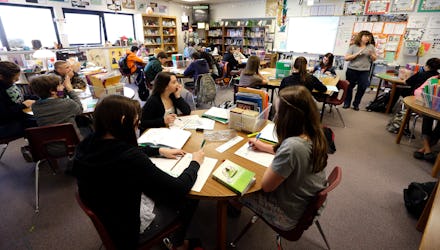America's Schools Have Been Starting at the Wrong Time Each Morning

High school and middle school need to start later. At 8:30 a.m. to be precise. According to a policy statement from the American Academy of Pediatrics (AAP) released Monday, teens need more sleep and schools should accommodate that.
AAP's statement cites various key figures that support a need to change school start times. For example, a National Sleep Foundation (NSF) survey found that 87% of American high schoolers were not getting the suggested full night's sleep for teens.
Teens are at risk of various issues from not sleeping the recommended eight and a half to nine and a half hours each school night, including depression, low standardized test scores, higher probabilities of car accidents, obesity, poor grades and a sub-par "quality of life."
Beginning the day later would help students be more efficient students and aid them during an important growth period. Additionally, if school times were later, students' sleep cycles would be much more reflective of their biological sleep needs.
Other risks: Researchers from Columbia University and the University of North Carolina recently published a study that found that 16-year-olds who don't get the needed amount of sleep have a 20% more risk for becoming obese by 21.
On top of that, USA Today reports that sleep-deprived teens are more likely to incur "increased risk for anxiety and depression, increased risk-taking behaviors, impaired interpretation of social/emotional cues, decreased motivation and increased vulnerability to stress" and "lower academic achievement, poor school attendance, increased dropout rates and impairments in attention, memory, organization and time management."
The solution: By starting school at 8:30 a.m. or later, teens would have more of a chance to sleep a full night. In the U.S., over 40% of public high schools begin the school day before 8 a.m., according to AAP.
And if you add in a student's commute, that can often mean that they are waking up before or right at dawn. Take into account after school activities like sports, language classes, jobs, homework and social lives (which includes the use of technology), these teens are having extremely long days with little to no recovery and reboot time to sleep.
The question of implementation: The AAP's suggestion is for high schools and middle schools to begin classes later in the morning so students can grow and learn.
But that does not mean the school day should be shortened. American students notoriously lag in math and science skills compared with other nations, and shortening the day would make that gap even larger. However, the AAP does not consider America's short school days compared to many other countries.
Either way, these kinds of considerations would need to be taken into account.
The policy statement looks at how America's youths can perform better, be safer and healthier and have improved livelihoods as adolescents. The only way to do that is to ensure that teens are getting enough sleep each night. So start the school day at 8:30 a.m. and give America's teens a fighting chance.
h/t USA Today